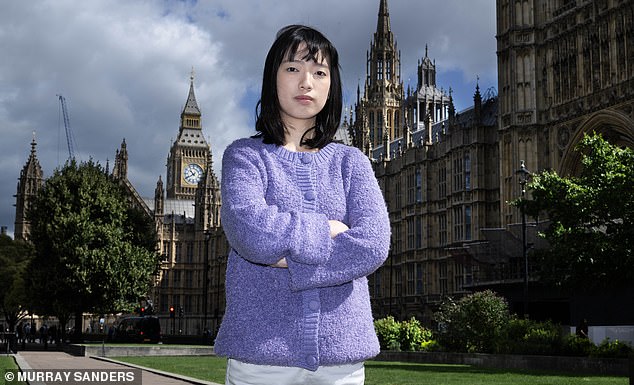Chloe Cheung never takes the same route home twice in succession. On the streets of Leeds where she lives and works, she carries self protection devices, including alarms and air tags, in case she is kidnapped.
It is the same when she’s on her frequent visits to London. Cheung, a slender, fragile figure, is 20 years old. But despite her childlike appearance, she has a £100,000 bounty on her head.
She never thought life in Britain would be like this. When Cheung left Hong Kong for this country with her family in 2020, she believed she was coming to a safe haven for free speech and democracy.
Having fled the violent suppression of protests in her homeland, cutting ties with friends and relatives, she considered the UK – with its special responsibility for Hong Kongers – her final hope.
Yet, amid harassment and constant threats from Beijing’s agents since her arrival here, she has received minimal support from the British police.
And over the past year, she has watched in horror as the Labour government has cosied up to the Chinese regime responsible for her exile.
In just a few weeks’ time, business minister Jonathan Reynolds will fly to Beijing in an attempt to reopen trade negotiations – talks which were suspended by the then-Conservative government in response to China’s brutal 2019 crackdown on pro-democracy activists in Hong Kong. It has been reported that Sir Keir Starmer himself will visit China early next year,

Chloe Cheung is one of a string of courageous dissidents to launch withering attacks on the way the Prime Minister has been kowtowing to China
Cheung is one of a string of courageous dissidents to launch withering attacks on the way the British Prime Minister has been kowtowing.
Along with other fearless activists now exiled in the UK – as well as some who bravely remain outspoken in Hong Kong – she has hit out at the determination of the Government to curry Beijing’s favour, with successive visits to the country by Labour ministers and pro-China policies, while notably failing to stand up for human rights there.
These warnings come at a critical moment, for Starmer is on the cusp of allowing a new Chinese mega embassy to be built in London, which critics fear could be used as a spy hub.
Meanwhile in Hong Kong, the ‘sham’ trial of British national and free speech campaigner Jimmy Lai – who faces charges of sedition and colluding with foreign forces and has been detained in solitary confinement since 2020 – is reaching its conclusion.
This all comes as the region’s pro-democracy movement appears on the verge of collapse.
Which makes the defiance of Cheung and others in the face of Beijing’s tyrannical regime all the more poignant. For it serves as a reminder of what Britain – with its centuries-long tradition of liberal democracy – might be about to sell down the river.
It was Christmas Eve 2024 when Cheung found out she had a bounty on her head.
She had not been formally notified of it by the Beijing authorities but alerted to the fact by a friend. She barely recognised the picture of the girl staring back at her as she scrolled through her phone.

The 20-year-old fled the violent suppression of protests in Hong Kong, cutting ties with friends and relatives
On her arrest warrant, alongside allegations of inciting secession and endangering national security, was a photograph of her geekish, bespectacled self, aged 11. The juxtaposition of her pre-teen innocence and the severity of the charges against her was both laughable and terrifying, exposing the extent of Beijing’s paranoia and its willingness to target anyone who defies its authority.
Before she left the territory, Cheung had played a fleeting part in the pro-democracy protests that erupted across Hong Kong in 2019. She was just 14 when she attended a demonstration there against a new extradition law designed to make it easier for Hong Kong to send criminal suspects to China.
The brutal crackdown by Beijing, underpinned by new national security laws passed in 2020, caused more than 150,000 Hong Kongers to seek refuge in Britain.
Some, including Cheung, defied the long arm of the Chinese Communist Party (CCP) and continued to speak out against its authoritarian regime.
She was invited to speak at the UN when still a teenager and now works for The Committee for Freedom in Hong Kong
Foundation, which advocates for democracy.
In December, China issued the arrest warrant for her, as well as for three other UK-based exiles: Carmen Lau, 30, Tony Chung, 24, and Chung Kim-wah, 65.
The warrants are not empty threats. Both Cheung and Lau say they have been spied on and followed in London, while their neighbours have been sent letters, allegedly by the CCP, offering one million HK dollars – nearly £100,000 – to turn them in.

On her arrest warrant, alongside allegations of inciting secession and endangering national security, was a photograph of her geekish, bespectacled self, aged 11
But the attitude of the British police has been perplexing to say the least.
In March, Lau was sent a ‘memorandum of understanding’ by Thames Valley Police, seen by the Daily Mail, in which it requested she ‘cease any activity that is likely to put you at risk’ and ‘avoid attending public gatherings’.
Cheung says she received similar advice from the Met, but not in the form of a written request.
They and fellow activists argue this approach is tantamount to encouraging ‘self-censorship’ – the very thing they have come to the UK to avoid. Lau says it ‘mirrors the outcome the Chinese are seeking’: to silence her.
Xi Jinping could almost have written the letter himself.
The activists also bemoan the lack of a dedicated hotline for exiles – they have simply been told to dial 999 – in contrast to the US, which has specialist
FBI agents to deal with ‘transnational repression’.
Thames Valley Police said its guidance was part of its ‘routine approach to prevention’ and ‘it is the choice of the individual whether they follow this advice’.
Needless to say, Lau and Cheung have not chosen to do so. In fact, they believe that by speaking out, they are protecting themselves.
The pair point to the reopening in recent weeks of extradition arrangements with Hong Kong, which would allow the UK to consider requests from Beijing to return criminal suspects on an ad hoc basis.

British national and free speech campaigner Jimmy Lai, who faces charges of sedition and colluding with foreign forces, has been detained in solitary confinement in Hong Kong since 2020
Campaigners question why the Government is restarting extradition arrangements now, and what ministers are seeking in return.
Ministers have said they would not allow political cases to be returned. But critics fear China would go after dissidents on other charges, such as fraud, as it has done in the past.
Cheung says she does not trust the UK Government’s ‘ability to identify whether a case is legitimate or not’. And by raising her profile as a political exile, she hopes Westminster will see through any attempt by Beijing to extradite her on other, spurious charges.
Still, the CCP has other means of reaching its targets.
In 2022, a pro-democracy protester was dragged into the Chinese consulate in Manchester and beaten up in a ‘barbaric’ attack.
Incidents such as this raise concerns over plans for China’s new £255million mega embassy.
If built, it would sit opposite the Tower of London on the site of the former Royal Mint and would be China’s largest outpost in Europe, with an internal floor area exceeding 563,000 sq ft.
Critics fear it will be used as a centre for espionage with its colossal presence and manpower harnessed to target dissidents.
Until recently, ministers appeared willing to back the plan. But this month, Angela Rayner, in her role as Housing Secretary, ordered China to explain why it has redacted blueprints for two suites and a tunnel inside the building ‘for security reasons’ – amid fears the basement could be converted into ‘spy dungeons’.
A final decision will be made before September 9.
Cheung and others are firmly opposed to the plan. ‘They don’t need that much space for an embassy,’ she says. ‘We know that it will be a surveillance help. They just shouldn’t do it.’ Citing the Manchester attack, she says it is only a matter of time before someone disappears, or is killed.
The mega embassy is seen as a key bargaining chip in the ‘normalisation’ of relations between the UK and China, as Labour seeks closer cooperation on trade and energy.

Jimmy Lai’s son Sebastien, who divides his time between London and Taiwan, wrote to Sir Keir Starmer earlier this year requesting a meeting regarding his father – but to no avail
Lau, as a former politician, understands that the two countries must work together. But not at the cost of human freedoms.
‘I feel less safe because the UK’s language towards China and Hong Kong is changing,’ she says. ‘I do not want to put it that way, but undoubtedly, the new Government has a different priority. It seems they compromise human rights for economic interests.’
It is a sentiment echoed by Sebastien Lai, son of Jimmy Lai, the British national and founder of the pro-democracy Apple Daily newspaper, who has been languishing in solitary confinement in a maximum security Hong Kong jail for the past four and a half years.
Apple Daily, a regular critic of the CCP, was forced to shut down in 2021 shortly after Lai was arrested for his part in pro-democracy protests. Now 77, his health has deteriorated significantly.
The concluding arguments in his trial on separate sedition and collusion charges began this week after being delayed due to Lai requiring treatment for heart palpitations.
His son believes the verdict is a foregone conclusion – Beijing wants a guilty verdict and will get one – but harbours hopes that the UK can still secure his release. If, that is, the Prime Minister is moved to.
Sebastien, 30, who now divides his time between London and Taiwan, wrote to Sir Keir Starmer earlier this year requesting a meeting regarding his father, but to no avail.
He believes the UK is too ready to concede to Chinese demands, without making his father’s release a condition of any deal.
Britain should not ‘bend the knee’ to trade with China, he says. Sebastien highlights the extradition agreement, the embassy and the UK’s failure to designate China as a high-tier threat on its foreign influence register as evidence of its supplicant approach – one that stands in stark contrast to his father’s.

UK-based exile Carmen Lau was sent a ‘memorandum of understanding’ by Thames Valley Police for her to ‘cease any activity that is likely to put you at risk’ and ‘avoid attending public gatherings’
‘My father stayed in Hong Kong to stand up for his beliefs of democracy and freedom that underpin British society,’ he says. ‘Whether he dies in jail or not, it doesn’t change what he stood for. But if he does die, it does change what we stand for as a country.’
A UK Government spokesman said Lai’s case is a ‘priority’ and the Foreign Secretary David Lammy met with Sebastien in June and called on Hong Kong to ‘end its politically motivated prosecution and immediately release Jimmy Lai’.
The spokesman added that any attempt to ‘coerce, intimidate, harass and harm’ dissidents living in the UK ‘will never be tolerated’ and that it was ‘quick to support individuals at heightened risk’.
Jimmy Lai is one of 781 political prisoners currently in Hong Kong, with the overall number to have been locked up since June 2019 now close to 2,000.
The national security laws that were imposed by Beijing the following year have had a chilling effect across society. Its far-reaching diktat has imposed the CCP’s view on school curricula, books and mobile games, while journalists and artists are ‘blacklisted’ or subject to ‘random’ tax audits to keep them in line.
Selina Cheng, chair of the Hong Kong Journalists Association, says the Chinese government accused her of underreporting her income by half and demanded she repay her taxes. Her associates have also received anonymous letters alleging wrongdoing in her work as a reporter.
Publications now self-censor not only on the overtly sensitive topics of democracy, but any subject that may involve a critique of government policy, she says.
More than 60 journalists have been detained since 2019.
Political opposition has been effectively quashed, with electoral reforms ensuring only pro-Beijing ‘patriots’ can run in elections.
In the meantime, it’s clear that those who chose to leave have done so at great personal cost.
Carmen Lau has not spoken to her parents since she arrived in the UK. She can only hear news of them through others.
It is a crime under national security laws to not report a fugitive, so any association or contact can be enough to land you in jail.
It means many of Cheung’s friends have cut ties with her entirely, while the relatives she has who remain in Hong Kong refuse to speak to her at all.
She accepts it is unlikely she will ever return home. Britain is all she has, but it has let her down.
A report by the Joint Committee on Human Rights published last month found that the UK is failing to protect foreign dissidents seeking sanctuary on our shores.
‘When I first arrived in the UK, I thought this country would protect me,’ says Cheung.
‘But all I’ve had is a phone call from the police, a self protection booklet, a mega embassy and an extradition treaty.
‘I am losing trust again and again. I don’t feel safe here anymore.
‘In future, when China is having even more influence here, what else would the UK sacrifice? Would it be one of us?’








